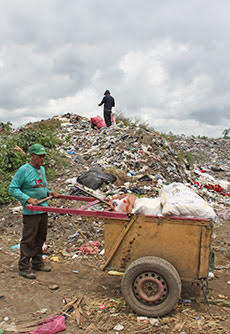The COVID-19 pandemic has put waste pickers and their crucial role in providing sanitation and solid waste management services in the spotlight. Their contribution to public health and safety, environmental sustainability and local economies, has earned them essential worker status in many places. Yet, many waste pickers continue to face harassment from the authorities as they navigate restrictions on access to recyclables, and their livelihoods are under threat as they compete with garbage collection companies for waste.
For waste pickers, harassment is a part of daily life, also before the pandemic. In-depth interviews with waste pickers, observation of their work and visits to a dozen dumpsites in six Latin American countries —conducted before the pandemic as part of WIEGO’s Waste Pickers and Human Rights project— painted a picture of working conditions so poor, that they amount to human rights violations. Most waste pickers, however, don’t know what these rights are and how to stand up for them. Our reports on human rights in Mexico, the Dominican Republic, Nicaragua, Guatemala, Argentina and Uruguay serve as a documentary testimony both to give visibility to waste pickers’ working conditions and to mobilize support in defense of their rights. WIEGO is working towards using this research and accompanying toolkit to advocate for better working conditions, in line with human rights standards.
Common rights violations in waste pickers’ working conditions are a lack of safety provisions: many workers experience cuts and infections working on dumpsites. In other places, access to dumpsites is being blocked, including through prohibiting certain means of transport that waste pickers use, and they experience harassment from local authorities who deny the workers access to waste.Moreover, waste pickers are often not considered for tenders for waste collection and recycling contracts and are denied space to sort recyclables.

In Mexico City, waste pickers are called “volunteer workers” and face harassment from the waste management union every time they try to get organized. In the city of Rosario, Argentina, authorities restricted the use of horse-drawn carts as collection vehicles by waste pickers, without any real replacement of work equipment. In Colombia, despite having achieved recognition as recycling service providers, Bogotá's waste pickers have faced obstacles to accessing recyclable waste since 2019, when waste containers were installed without adequate consultation or study. The design of these made it difficult for waste pickers to access recyclable waste and, in the absence of education for the general public, they are filled with mixed waste.
In Uruguay, waste pickers face work restrictions in the areas of the city that produce the best recyclable material, including the installation of “anti-vandalism” containers, the design of which prevents access to recycling. In the Dominican Republic, waste pickers are prosecuted just for doing their work. Particularly in the city of Santiago de los Caballeros, waste pickers have been violently expelled from landfills and their leaders and organisations have been criminalised and persecuted by the municipal authorities. Across Central America, many dumps are under the control of mafias and, in the absence of any state intervention, waste pickers workers in those are easily abused and exploited by criminal groups.
In several countries in South and Central America, waste pickers have been unable to form strong organizations, while they are often exposed to systematic violations of their rights. In some countries, such as Argentina, Colombia, Brazil, Ecuador and Chile, waste pickers have been able to form national movements that have managed to partially address these rights violations.
For the six countries targeted in this human rights project, a toolkit has been developed that includes a memory game and Snakes and Ladders, a comic and a video, and a poster and a guide, through which waste pickers learn to understand their rights and how to stand up for those.
While there have been advancements in the recognition in some of the countries included in WIEGO’s report, waste pickers and their organizations in Latin America face a great threat, including a lack of guarantees to carry out their work, persecution by the government, discrimination by society and, finally, pressure from waste collection companies or private recycling initiatives that might take away the recyclable waste on which the lives of waste pickers depend.

The initial interviews that WIEGO and local partners conducted with waste pickers about their working conditions and the report based on these findings were included in the annual report of the Inter-American Commission on Human Rights. This provides a tremendous advocacy opportunity to build upon.
Training will help organizations to become stronger and document the human rights violations they face, which enables more research that can then be used to advocate for better working conditions for waste pickers. It is an important step in guaranteeing respect for the human rights of essential workers, who help guarantee the public’s health and safety and who rely on their trade to feed their families.
Several experiences have shown that waste pickers and their organizations can be sustainably integrated, recognised and remunerated for the recycling service they provide, which in turn brings environmental and economic benefits to society as a whole. But this cannot be achieved without respect and protection of their human rights.
Top photo: A waste picker at a dumpsite in Guatemala. Credit: Federico Parra and Tania Espinosa